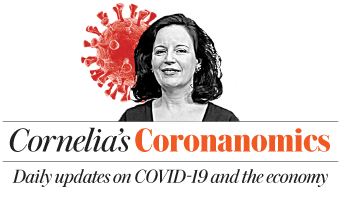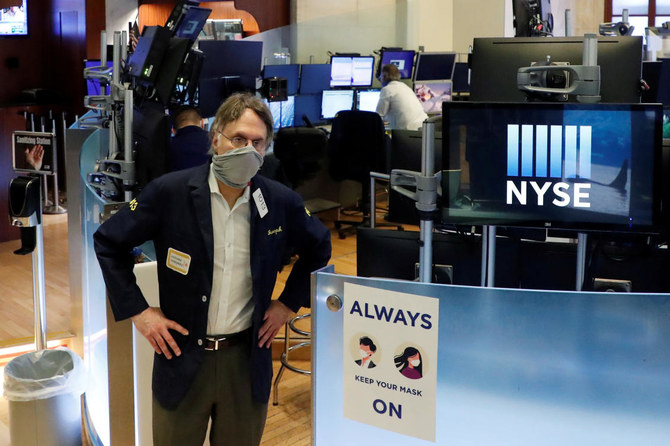What happened:
Global stock markets experienced a risk-off sentiment at the beginning of the week amid fears of a second COVID-19 wave in the US and elsewhere.

The list of countries most affected by COVID-19 is topped by the US, with 2.4 million confirmed cases, and Brazil, with 1.2 million confirmed cases. Texas Gov. Greg Abbott has halted the reopening of the state’s economy. North Carolina, Louisiana and Kansas also paused plans to loosen restrictions. The mood in markets changed on Thursday afternoon and turned risk-on in Asia and Europe for Friday.
US first-time jobless claims for the week ending June 19 came in higher than anticipated. They stood at 1.48 million, only a small decrease from the 1.56 million of the preceding weeks. The trajectory of the curve may still be downward sloping, but much less steeply than anticipated. Of the $2.6 trillion earmarked by the Fed and Congress to support the labor market, only $643 billion have so far been disbursed.

On Thursday the Fed loosened the so-called “Volcker Rule” for banks, by relinquishing requirements for lenders to hold margins when trading derivatives and by providing more clarity on how banks could increase their dealings with certain funds.
The Fed also provided new guidelines for banks regarding third quarter dividends and share buy-backs. Dividends are capped at second quarter levels and share buy-backs will not be allowed for the third quarter.
This makes sense when looking at profit erosion and the results of stress tests.
While US banks are much better positioned than they were before the financial crisis, the pandemic will have a lasting effect, which why is why erring on the side of caution may be wise. Wells Fargo’s profits slumped by 89 percent in the first quarter. Goldman Sachs and Morgan Stanley fared worst in the regular portion of the stress test. Their capital levels declined by 6.4 percent and 5.5 percent, respectively.
Austria issued a 100-year bond at 0.88 percent. It was the most subscribed bond issuance in Europe this week, which is evidence that investors are happy to forgo yield for less risky investments.
In Germany the scandal of a missing €2 billion ($2.24 billion) from Wirecard’s books led to the company filing for bankruptcy. It shed light on inadequate performance by both the supervisory board and the German regulator BAFIN.
The German finance minister Olaf Scholz expressed his concerns about what the scandal meant for the Germany as a financial center as well the overall reputation of the country. The EU Commission has reportedly asked its markets regulator to investigate the events as well as the supervisory response leading to the collapse of Wirecard. Meanwhile, Visa and others have halted cooperation with the fintech provider.
Background:
On Wednesday the IMF published its latest economic forecasts. It downgraded projections issued in April’s World Economic Outlook from 3 percent to 4.9 percent for 2020.
This represents the deepest economic contraction since the Great Depression. They also revised the post-pandemic boost for 2021 from 5.8 percent as forecasted in April to 5.4 percent. This contrasts other forecasts, such as the OECD’s, which predicts the global economy to shrink by 6 percent in 2020 as a base case, but by 7.6 percent if there is another wave of COVID-19.

IMF chief economist Gita Gopinath doubled down on weak projections for 2021. She said neither developed nor emerging economies will reach 2019 pre-pandemic highs before the end of 2021, except for China.
The gloomy forecast is based on the impact of lockdowns and a potential second wave, as well as the danger that social distancing rules will persist, unless an effective antiviral drug or vaccine is found.
This will slow down economic activity leading to anemic growth. Another danger is the pandemic affecting global trade — one of the key components of lifting hundreds of millions out of poverty over the past few decades.
ECB President and former IMF chief Christine Lagarde supported Gopinath’s assessment, stating: “The recovery would be ‘incomplete’ as trade is unlikely to return to pre-pandemic levels and productivity might be weaker.”
She also predicted that the recovery from the coronavirus would be restrained and new industries would emerge, while some existing sectors, such as airlines, hospitality and entertainment would come out of the recovery process in a different shape. Some of them will likely be permanently hurt.
Both Gopinath and Lagarde urged policymakers to take into consideration the needs of countries and segments of the population most vulnerable to the economic impact of the pandemic.
They highlighted unprecedented levels of government debt following economic stimulus packages — something not seen since World War II — which would have ramifications for tax structures in most countries.
Where we go from here:
Several major investors such as Mubadala have reoriented their investment strategies from risk-off in the aftermath of the pandemic, into taking calculated risks. They are examining both developed and emerging markets for sectors which will benefit from a post-pandemic world, including med-tech, AI, life science, and agri-tech, as well as technology applications.
New York Stock Exchange President Stacey Cunningham shed light on the NYSE’s work with the Fed on refining the process of direct listings, which will allow issuers to separate capital raising from a public listing, but go simultaneously where this is desired. In the recent past public listings were tested with Spotify and Slack.
— Cornelia Meyer is a Ph.D.-level economist with 30 years of experience in investment banking and industry. She is chairperson and CEO of business consultancy Meyer Resources. Twitter: @MeyerResources















